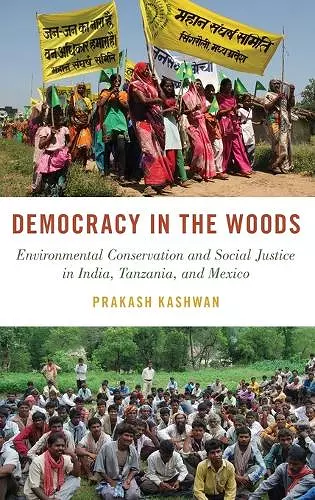Democracy in the Woods
Environmental Conservation and Social Justice in India, Tanzania, and Mexico
Format:Hardback
Publisher:Oxford University Press Inc
Published:9th Mar '17
Currently unavailable, and unfortunately no date known when it will be back
This hardback is available in another edition too:
- Paperback£30.49(9780190935504)

How do societies negotiate the apparently competing agendas of environmental protection and social justice? Why do some countries perform much better than others? Democracy in the Woods answers these questions by explaining the trajectories of forest and land rights--and the fate of forest-dependent peasants--in the forested regions of India, Tanzania, and Mexico. To organize a comparative inquiry that straddles the fields of comparative politics, historical institutionalism, and policy studies, this book develops a political economy of institutions framework. It shows that differences in structures of political intermediation--venues that help peasant groups and social movements engage in political and policy processes--explain the varying levels of success in combining the pursuits of social justice and environmental conservation. The book challenges the age-old notion that populist policies produce uniformly deleterious environmental consequences that must be mitigated via centralized systems of environmental regulation. It shows instead that the national leaders and dominant political parties that must compete for popular support in the political arena are more likely to fashion interventions that pursue conservation of forested landscapes without violating the rights of forest-dependent people. Mexico demonstrates the potential for win-win outcomes, India continues to stumble on both environmental and social questions despite longstanding traditions of popular mobilization for forestland rights, and Tanzania's government has failed its forest-dependent people despite a lucrative wildlife tourism sector. This book's political analysis of the control over and use of nature opens up new avenues for reflecting on nature in the Anthropocene.
Democracy in the Woods also makes an important contribution to the literature on institutional change ... Kashwan incorporates structure and agency into his analysis in a way that is reminiscent of Anthony Giddens' structuration theory The book is an important ... contribution to the emerging body of work seeking to bridge the gap between historical institutionalism and rational choice institutionalism. * Craig M. Kauffman, Perspectives on Politics *
Kashwan's brilliant book offers a multi-scale political analysis of the production of policy for the control and use of nature. He develops a neat and feasible way of analyzing how national forestry regimes come to be and how they act for and on different classes of people. By showing how international campaigns for forest and wildlife conservation entangle with unequal access to policymaking processes, his forward-looking analysis opens up new scales of reflection on nature and justice in the era of global environmental change. This book will be of great interest to students of environmental politics, environmental sociology, environmental anthropology, political ecology, and environmental studies. * Jesse Ribot, Professor of Geography, University of Illinois *
Kashwan ably applies institutional political economy to explain the political dynamics that shape 'forestland regimes' - a fresh concept that bridges land tenure and control over forest resources. Democracy in the Woods combines multi-level analysis with nuanced cross-national comparison to reveal how historical legacies, the state, local politics and social actors interact to shape conflicts over social equity and environmental conservation." -Jonathan Fox, author of Accountability Politics: Power and Voice in Rural Mexico and Professor in the School of International Service, American University
Prakash Kashwan has made a hugely significant contribution to our understanding of the social justice dimensions of environmental policy. By focusing on India, Tanzania and Mexico he brings in the third dimension of economic growth as well giving this book a distinctive niche. Drawing from his extensive field research he enriches the discourse on ecological issues and makes us aware of how such issues are profoundly impacted by political decisions taken in the name of equity and growth. It will appeal to scholars, administrators and the general reader alike.Having been involved with environmental policy-making and implementation in India over the past eight years, I related to his analysis and found myself comparing my own experiences with his findings. * Jairam Ramesh, former Minister of Environment and Forests, Rural Development 2009-2014 Government of India *
Kashwan argues persuasively that there is no simple trade-off between poverty reduction and environmental conservation, and that a crucial determinant of the form of national environmental protection is whether parties provide an avenue for peasants to effectively challenge forest regimes not in their interest. Careful, insightful scholarship. Highly recommended. * CHOICE *
I recommend [Kashwan's] book to anyone concerned about the fraught relationship between conservation and social injustice. His book challenges us to turn away from small technocratic fixes and refocus on big issues. Hopefully, we are up to the task. * Robert Wasserstrom, Society and Natural Resources *
An ambitious, scholarly, and challenging book...[and] an erudite study, littered with inspiration and readings from numerous fields. It is a significant contribution to a growing corpus of important work from this author that explores the relationship between conservation, marginality, and politics. * Dan Brockington, Conservation and Society *
ISBN: 9780190637385
Dimensions: 157mm x 239mm x 33mm
Weight: 590g
336 pages